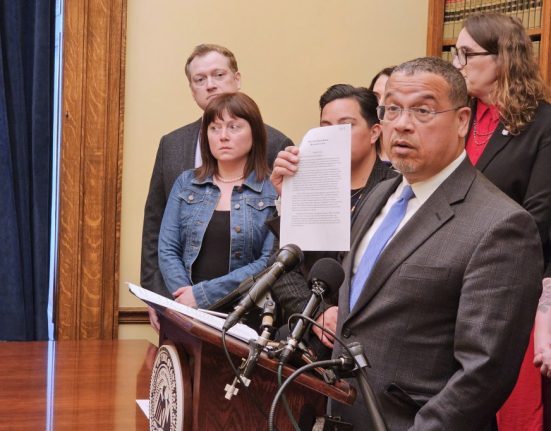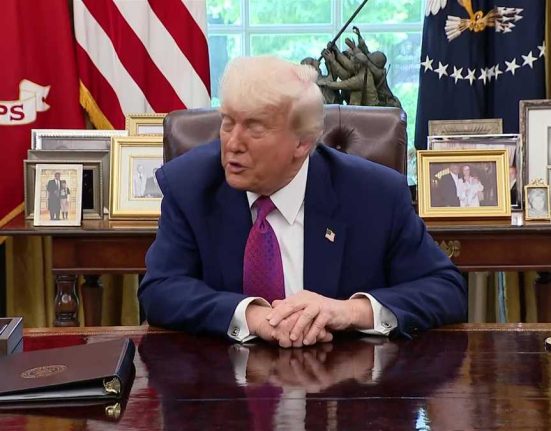This is an audio transcript of the FT News Briefing podcast episode: ‘Washington weighs in on crypto’
Marc Filippino
Good morning from the Financial Times. Today is Tuesday, July 15th, and this is your FT News Briefing. The EU is ready to spend big on eastern members. And bitcoin looks like it’s in fact headed to the moon. Plus, Nissan is having a rough go of it, but it’s hoping a focus on the US market can change all that. I’m Marc Filipino, and here’s the news you need to start your day.
[MUSIC PLAYING]
Marc Filippino
The European Union is shaking up its budget and its eastern countries are the winners. A leak proposal outlines a new way to allocate more than €750bn of farming and development funds. The plan shifts the common budget to favour newer member states and the ones that border Russia. And it gives those governments more leeway on spending so they could divert money from things like regional development and spend it on defence. The European Commission will officially launch this as part of its seven-year budget tomorrow. That proposal needs to get approval from all 27 member states to pass.
[MUSIC PLAYING]
Marc Filippino
It feels like the cryptocurrency sector is making unprecedented strides right now. Bitcoin hit a record high yesterday. It went north of $122,000. And this is happening as lawmakers in US Congress are set to vote on a series of crypto bills. We have the FT’s digital markets correspondent Nikou Asgari here to talk more about it. Hey, Nikou.
Nikou Asgari
Hi.
Marc Filippino
So Nikou, tell me about the legislation that’s got investors so excited about bitcoin.
Nikou Asgari
Yeah. So there’s three pieces of legislation that are being debated this week in Washington, and all three of them in one way or another are helping to bring different parts of crypto more in line with traditional finance and to give rules that will give confidence to investors and to companies to use them.
Nikou Asgari
So for example, there is the Clarity Act or the Digital Asset Market Clarity Act. And this is really sort of a market structure bill to give clear rules and regulations on digital assets broadly. Then there’s the Genius Act, which focuses really on stablecoins, which are tokens that are pegged one-to-one typically with the US dollar. And if this is passed it will help companies, both traditional and crypto, hold and trade and create their own stablecoins much more comfortably than they perhaps are at the moment. And the third one is the Anti-Central Bank Digital Currency Surveillance State Act, which really aims to stop the US Federal Reserve from creating its own digital currency and in doing that will give a lot of power to private stablecoin and private currencies that, you know, exist and make up the majority, if not all of the market at the moment.
Marc Filippino
OK. Let’s take a step back here because bitcoin wasn’t doing so hot for a while. Nikou. I mean, how did it make this rise to the top?
Nikou Asgari
Yeah, absolutely. I mean, just a few years ago when Sam Bankman-Fried’s crypto exchange FTX collapsed, it sent the price of bitcoin down to as low as about $16,000. Since then, it’s been on a sort of recovery, upward recovery. But really the kicker was when Donald Trump won the election in November and returned to the White House. That has sent the price of bitcoin rising because not only is he, his family, a lot of people in Washington, in the cabinet really pro-crypto. But they’ve also helped crypto become more mainstream.
They’ve stopped a whole bunch of lawsuits against the biggest crypto companies you can think of. They replaced the head of the Securities and Exchange Commission, who was previously pretty anti-crypto, with someone who’s pretty friendly towards crypto. And now this week, these new bills that are set to expected to pass all signal just this change in sentiment towards crypto, which has helped the price of bitcoin rise so much.
Marc Filippino
And I should say Nikou, they’re not just pro-crypto, the Trump administration, but the Trump family is also involved in crypto, right? They have memecoins.
Nikou Asgari
Yeah, absolutely. Trump and his wife Melania have their own memecoins, which are just tokens that you can buy and trade like any other. Trump and his sons also run and promote this company called World Liberty Financial, which again has its own stablecoin and another coin that they’re set to launch. So they’re making a lot of money also from the industry that the president himself is promoting.
Marc Filippino
I always ask this question when there’s steps being taken to make crypto more mainstream, but isn’t the whole point of crypto to be a decentralised currency? It’s not Fiat, it’s not controlled by the government. What does it mean that the government is getting more involved and the price is still going up?
Nikou Asgari
Yeah. It’s so interesting, isn’t it? I mean, crypto was, as you said, created out of this idea of we’re anti-establishment. We don’t want regulators, governments looking at us, identifying us, you know, being in any way involved with what’s happening here and yet now you’ve got the biggest crypto companies in the world that are so delighted that these rules are set to be passed and so delighted that Washington is so interested.
It’s a strange sort of balancing act, but I guess from the crypto companies, they say that as traditional finance gets more involved, as crypto becomes more mainstream with people being more comfortable with it, it’s just for the best, right? You get more money, you get more investors, and it’s to the benefit of these crypto companies.
Marc Filippino
That’s the FT’s digital markets correspondent Nikou Asgari. Thanks, Nikou.
Nikou Asgari
Thanks.
[MUSIC PLAYING]
Marc Filippino
UK chancellor Rachel Reeves is gonna try to hype up the country’s budget today. She’s speaking to London’s top banking brass in the city’s Mansion House. The speech is a big moment for Reeves. She looked like she might lose her job just two weeks ago. That’s when MPs from her own Labour party rebelled against her plan to cut billions of pounds on welfare spending. The cuts didn’t happen and that left a big hole in the budget. FT sources expect Reeves to emphasise economic growth and stability in her speech today and some are worried that she’ll fill the remaining fiscal hole with higher taxes on the financial services industry.
[MUSIC PLAYING]
Marc Filippino
Nissan is facing a bit of an uphill battle, and the company is betting that the latest version of its unique hybrid technology will expand sales in the US. The tech is called e-Power. But even if the push is successful, is it enough to save the company? The FT’s Harry Dempsey covers Nissan from Japan. Hey, Harry.
Harry Dempsey
Hey, thanks for having me.
Marc Filippino
So what is Nissan’s hybrid tech e-Power and how does it differ from other hybrids?
Harry Dempsey
So this hybrid tech, it’s very similar to the Toyota Prius style hybrid technology. The feel of the drive is like an EV, but you don’t need to charge it at your home. You just fill it with gas as normal and you know you have a good driving range with good fuel economy and is now in its third generation for Nissan. And it’s very important because hybrid cars have been selling like hot cakes in the US. And this is the area where NIS Nissan has really lacked this sort of product because it was worried that this e-Power technology didn’t do well enough on the highways and Americans drive quite a lot on the motorways at high speed, so that was important. But now it feels with the third generation of this technology that it’s good enough now to sort of make a success of the US market.
Marc Filippino
Harry, just remind us, how badly are things going over at Nissan globally?
Harry Dempsey
Things are going very badly for Nissan. So sales were about 5.5mn vehicles back in 2018. That’s now down to about 3.5mn. So sales have been gradually dropping in recent years, and cash flow is a real problem for the company. It really does need to get sales going again, which is what this e-Power technology is going to be vital for doing.
Marc Filippino
And what are the plans to market its e-Power technology here in the US?
Harry Dempsey
Yeah, so the e-Power technology is going to feature on the Rogue, which is one of their best-selling vehicles in the US, which is an SUV vehicle. And I think the challenge for Nissan really is that the brand has been damaged somewhat in the US because the vehicles haven’t been selling, and therefore the company then sells them at a discount and it gives them this feeling that your brand is a sort of cheap one.
And I think the other challenge is this is the third generation of e-Power and consumers still don’t really know what it is. It’s not a simple hybrid, but in a way for a consumer, it kind of just is a hybrid. What matters for a consumer is how much does it cost and what’s the fuel economy like? And so I think for Nissan, it’s a vexing question, which I think has led to a rather sort of confused campaign and messaging about what e-Power is.
Marc Filippino
OK. But would success in the US actually secure a comeback for Nissan? I mean, why is that market so important for the company?
Harry Dempsey
So, for a lot of the legacy car companies, China has become impossible, and that was the source of growth and profits for them in the last decade. But Chinese EV manufacturers have taken over that market, so that leaves you with a dilemma of where do you go? Where is safe? The US is really the key one for the company to work out. It’s considered to be protected from the Chinese competition because the US does not want Chinese car companies coming in.
Harry Dempsey
And there is a question of is there still a good window to sell this kind of hybrid-esque technology? And there probably is a little bit of a decent window, but whether that’s enough to guarantee the success of the company, when you think of the huge amount of money that’s needed to be spent on this shift to a new technology, I just don’t think e-Power on its own is going to be enough. And Nissan itself, I think admits it needs partners to help give it the scale and the financial power to compete.
Marc Filippino
Harry Dempsey is the FT’s Tokyo correspondent. Thanks so much, Harry.
Harry Dempsey
Thank you.
[MUSIC PLAYING]
Marc Filippino
You can read more on all these stories for free when you click the links in our show notes. This has been your daily FT News Briefing. Check back tomorrow for the latest business news.







